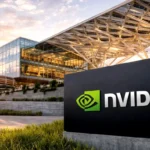Key Points
- Qualcomm is exploring a potential buyout of Intel, but analysts doubt the feasibility.
- Intel’s loss-making foundry business would be a major challenge for Qualcomm, which lacks experience in chip manufacturing.
- The deal, if realized, would be the largest ever in the semiconductor sector and face antitrust scrutiny.
- Intel’s market value has fallen below $100 billion, while Qualcomm’s stands at $190 billion.
Qualcomm’s interest in acquiring Intel could accelerate its diversification efforts but presents significant challenges, including inheriting Intel’s loss-making semiconductor manufacturing unit. If realized, this buyout would be the largest ever in the chip sector and would likely face intense antitrust scrutiny, as it would combine two industry giants with substantial shares in the smartphone, personal computer, and server markets.
Intel’s shares rose 3% following media reports of Qualcomm’s early-stage approach, while Qualcomm’s shares fell. The deal could make sense from a product perspective, given that both companies have complementary product lines, but analysts are skeptical about its feasibility. Bob O’Donnell, founder of TECHnalysis Research, expressed doubt that the deal would proceed, noting that Qualcomm would likely not want to acquire all of Intel and that breaking up Intel’s product and foundry businesses would be difficult at this stage.
Intel, once the dominant force in the semiconductor industry, has recently struggled, particularly with its contract manufacturing unit that aims to challenge TSMC. Intel’s market value has dropped below $100 billion, the first time in three decades, and it has fallen behind in the generative AI boom. In contrast, Qualcomm’s market value stands at about $190 billion. Still, analysts believe the deal, if it goes through, would primarily be funded through stock, raising concerns about dilution for Qualcomm’s investors.
Qualcomm, led by CEO Cristiano Amon, has been working to diversify beyond its core smartphone business, expanding into industries like automotive and PC chips. However, it remains heavily reliant on the struggling mobile market, which a post-pandemic demand slump has hit. It isn’t Qualcomm’s first attempt at a major acquisition; it previously pursued a $44 billion deal to buy NXP Semiconductors in 2016, only to abandon the bid after failing to secure approval from Chinese regulators.
A key challenge in the potential Intel acquisition would be Intel’s foundry business. Qualcomm has never operated a chip factory, relying instead on contract manufacturers like TSMC. Analysts doubt Qualcomm’s ability to manage Intel’s foundry operations, which recently secured Amazon as its first major customer. Stacy Rasgon of Bernstein commented that it’s unclear how Qualcomm would be a better owner for these assets and added that scrapping them is not politically viable, especially given Intel’s role in the U.S. government’s push to expand domestic chip production through the CHIPS Act, under which Intel has received $19.5 billion in federal grants and loans.




